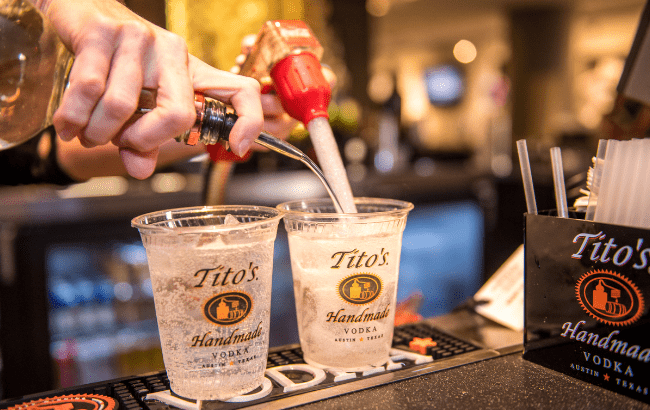Spirits in limbo as RNDC exit disrupts California
By Nicola CarruthersDistribution giant Republic National Distribution Company (RNDC) has pulled out of California, threatening the financial viability of scores of distillers.

Securing distribution in California, the biggest market for spirits in the US, is a major achievement for brands. But last month, Republic National Distributing Company (RNDC), the second biggest alcohol distributor in the US, called it quits in the state. One of the biggest distributors in the US leaving the market will undoubtedly have devastating effects on small brands, which must rely on a distributor to legally sell their products outside of their distilleries.
This decision, without warning, has caused significant disruption for numerous alcohol brands. RNDC’s exit has left many producers scrambling to find new distributors, and has raised concerns about the future of those brands, and the impact on RNDC workers.
Effective from 2 September, the decision to leave California is due to “rising operational costs, industry headwinds, and supplier changes” that made it an unsustainable market, said RNDC CEO Bob Hendrickson.
The September deadline is also particularly severe as it comes just before the crucial selling months in the lead‐up to Christmas.
But what was the reason behind what feels like a rash decision? One industry insider, who has spent decades in the spirits industry, and asked to not be named, believes the fallout in California stems from RNDC’s 2022 purchase of Young’s Market Company (which included its distribution operations in California and other West Coast states) – a deal RNDC “overpaid for” and led to a lot of debt, the anonymous source alleges.
RNDC failed to provide responses to my questions, instead directing me to an internal message from Hendrickson.
The firm has also not confirmed how many jobs have been affected by the decision to exit the state.
Hendrickson’s email did acknowledge the end of Brown‐Forman’s distribution partnership “across all open markets” from 1 August, but said this was “part of a broader strategic shift – not performance‐related”.
RNDC also lost Tito’s Handmade Vodka, and Gallo’s High Noon seltzer brand in California. These brands moved to a well‐ known beer distributor in California, Reyes Beverage Group, which did not respond to an interview request.
There is speculation the loss of business in California from these large companies left a big hole in RNDC’s sales, prompting its exit from the market. The informant speculates that several distributors have had to renegotiate margins to keep suppliers, which has put them in a “worse financial position”.

Smaller players
Big‐name brands that were with RNDC are likely to be picked up by another distributor in the state, but what about the smaller players that have been left with mere months to find a new distributor?
Those brands have been put in a “precarious position”, says Adam Spiegel, founder of Californian distribution company Freebrook Imports, as they have “no way of selling product to a retailer”. The three‐tier system in the US means brands in the state must sell their products through a distributor, so without one these products can only be picked up directly at the distillery. “It puts a whole strain on the system,” says Spiegel. “There are 1,500 suppliers that are freaking out that they have no idea how they’re going to sell their product in California.”
However, he believes the situation is a chance for brands to exit their contracts and consider where and how they sell their products. “California is essentially five states in one. It’s a big state, the fourth largest economy in the world, so people can get very hyper‐regional and do very well in a particular region, versus trying to manage the entire state from the get‐go.”
California is also the US state with the greatest number of craft distillers – 378 as of August 2024 (up by 55% on August 2023), according to the Craft Spirits Data Project.
Alex Villicana, president of the California Distillers Association, notes that the organisation has about 60 members, with around half of them represented by RNDC. “There’s no replacement to get to market. Once they lose those accounts, there’s just going to be kind of backfilling; the restaurants and stores are just going to pick up other brands that are on the books of Southern Glazer’s Wine and Spirits or Reyes, so they’re not going to basically be able to get those products back on the store shelves.”
Temporary measure
The organisation is pushing to ensure the direct‐to‐consumer (DTC) spirits‐shipping bill is made permanent in California before it expires at the end of this year. It had been passed in January 2022 as a temporary response to the Covid‐19 pandemic. “Wholesalers have been consolidating in California, and with them leaving, it has basically made the craft distiller situation really critical here in California,” Villicana says.
He adds that tourism is also taking a “substantial hit” in the state, making the situation even worse for distillers. “So we’re getting hit with losing shipping, losing our wholesalers, as well as a downturn in tourism,” he warns of the state of craft distilling. “We’re seeing quite a few that are on the verge of closing, or have already closed,” he says, noting the surprise closure of Sacramento’s JJ Pfister Distilling Co.
“There’s a good chance that for some brands that are already on the precipice of potentially closing that this could be a death blow for sure,” warns Spiegel.
Villicana adds: “If we don’t get the DTC shipping bill passed, I’m going to bet we’re going to lose 30‐40 distillers here in California; it’s going to be pretty substantial.” And what of the future of the three‐tier system? “I’m hoping that this adds some fire to breaking apart the three‐tier system a little bit, and that’s being said as someone who lives in the three‐tier system as a new distributor,” says Spiegel. “Does the three‐ tier system have to continue to exist the way it exists today?”
Wine & Spirits Wholesalers of America, the trade body for distributors, also refused to comment on RNDC’s exit.
California’s distribution landscape will likely consolidate, with the remaining players like Reyes, Breakthru and Southern Glazer’s absorbing parts of RNDC’s portfolio in California. But it seems RNDC’s departure may hasten the need for a hybrid distribution model that embraces digital solutions, and one that can exist within the regulated three‐tier system.
Related news
Non-alc brand Wilderton shutters business
Stoli Group’s US arm shifts to liquidation
Wild East Liquor launches Mekong Dangerous spiced coffee spirit
